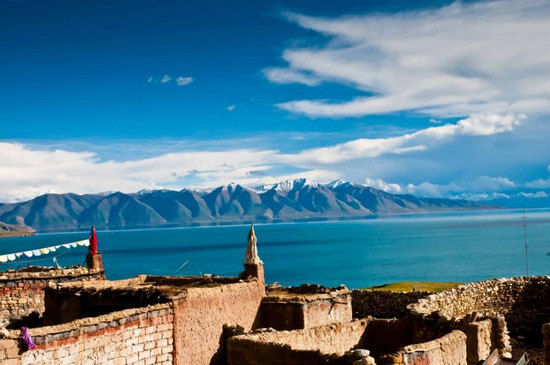
It is often said that the pristine scenery and magnificent landscapes of China's Tibet Autonomous Region are therapeutic for the mind. Yet the benefit of travelling to Tibet goes far beyond the spiritual plane, it can actually be medicinal. It has been proven that the hot springs on the plateau can be effective for curing bodily ailments.
According to Tibetan medical belief, the season of peach blossoms, or spring, is the time when symptoms of potential illnesses are most easily seen. And a dip in the hot springs is the best way to induce such symptoms.
Rich in underground terrestrial heat, the Tibetan plateau has a good number of hot springs of various sizes with differing mineral content. Although highly regarded for their water quality, the hot springs are mostly located in far-flung areas of the autonomous region.
Among those that are accessible, Dezhong hot spring is frequently sought after by tourists. It is connected with Lhasa by a bus route which opens every two days. Passengers on this bus are mostly local farmers and herdsman often seen carrying with them farm produce or small domestic poultry.
About 120 kilometers away from Lhasa, Dezhong hot spring is situated at the bottom of a valley 4500 meters above sea level with a row of sharp rising mountains looming in the distance.
The hot spring is divided into two ponds by a wooden bridge with the main section being about five meters wide. The other part of the pond is said to be particularly effective for healing arthritis. Loosely sheltered by wood planks, water in the two ponds is waist deep and has a temperature which remains at approximately 40 degrees Celsius all year round.
Overlooking Dezhong hot spring are rows of Tibetan houses on the banks of the valley which make up the village of Dezhong.
Tibetan families from other villages are often seen camping here with a week's supply of food and other materials. In addition to their daily dip in the bubbling hot water, the Tibetans also visit an ancient Buddha temple nearby the village as a finishing touch to their "purifying" pilgrimage.
For tourists, a Tibetan hot spring experience is not complete without local refreshments such as Chang-barley wine and the local delicacy tsamba, made from roasted barley. But local tourism in Dezhong is not as developed as it is in Lhasa; few hotels or restaurants can be found in Dezhong village. Tourists are advised to bring their own food and over-night supplies if they plan to stay more than a day. The bus ride from Lhasa to Dezhong hot spring takes five to six hours, so the recommended method of transportation is to rent a car in Lhasa.
